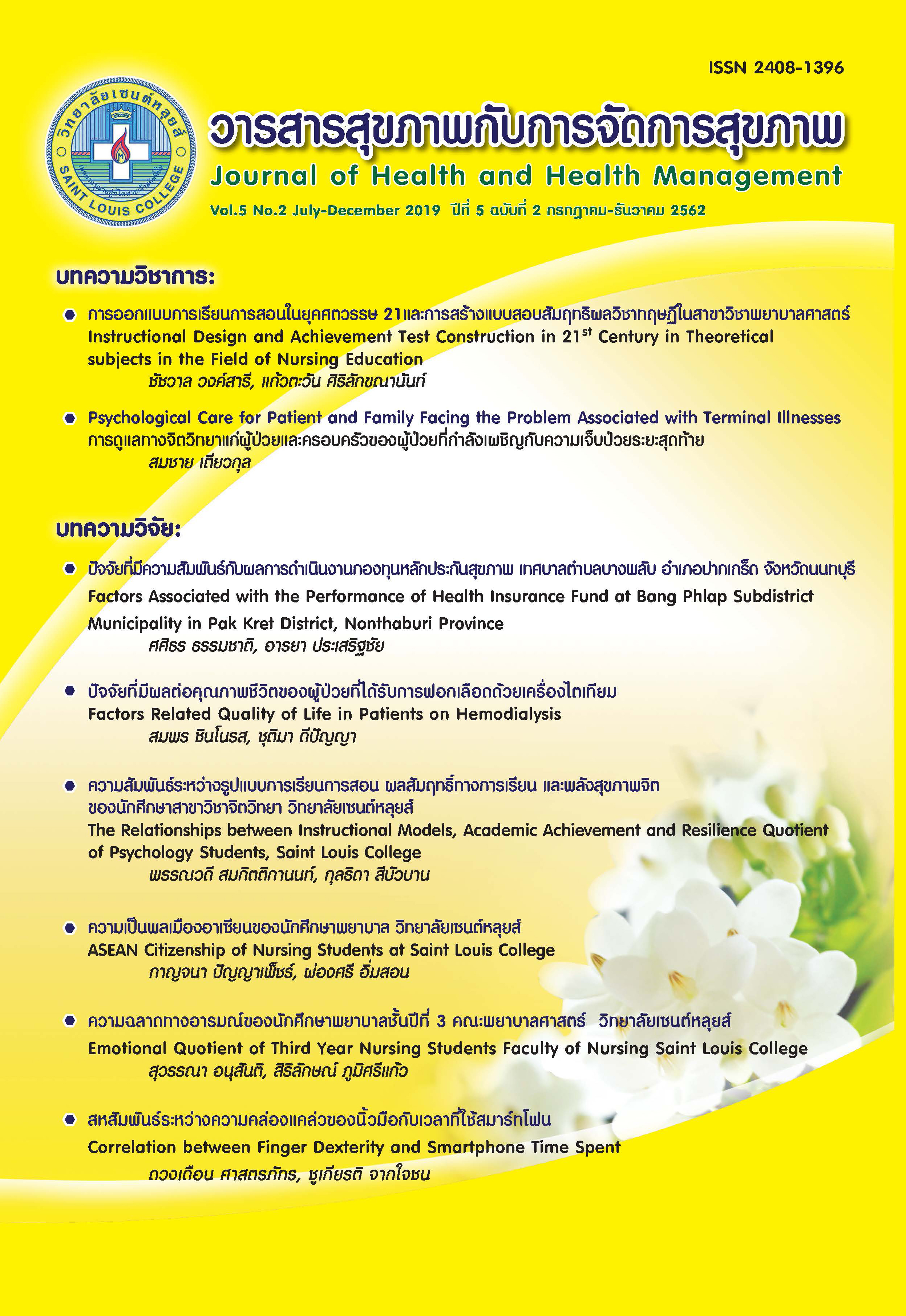Psychological Care for Patient and Family Facing the Problem Associated with Terminal Illnesses
Keywords:
terminal illnes, palliative care, fear of death instinct, psychological interventionAbstract
Death is inevitable. An individual reaches this point in his life through either a sudden or an expected death. People who face expected death usually suffer from terminal illnesses. Terminal illnesses are illnesses caused by chronic, usually incurable diseases, which apparently limit a person’s life expectancy. Although it is well accepted that death is a normal process of development, it is quite difficult to accept this fact. This is under the urge of “fear of death instinct”. Patients who experience terminal illnesses develop psychological problems as they anticipate death. In order to help ease the patients’ pain and worry, as well as to help them cope with the disease, medical institutions and organizations provide the best intervention called, “Terminal Care or Palliative Care”. Palliative Care generally provides relief from pain, although not a cure for the illness, a patient undergoing palliative care develops comfort in his situation and readiness to death, when the time comes. Palliative care for the patients and proper interventions for family members are needed. Some of psychological theories and interventions are proposed and discussed in this article.
References
Anderson, T, Watson, M, & Davidson, R. (2008). The use of cognitive behavioural therapy techniques for anxiety and depression in hospice patients: a feasibility study. Palliative Medicine. 7, 814-821. Retrieved from: https://doi.org/10.1177/0269216308095157. Epub2008Aug28.
Balasubramanian, C., Subramanian, M., Balasubramanian, S., Agrawal, A., Raveendran, S. and Kaliaperumal, C. (2018). “Thanatophobia”: Physician’s Perspective of Dealing with Patients with Fear of Death”. 1,103-104. doi: https://doi.org/10.4103/jnsbm.JNSBM_102_17.
Balogh, P. (1974). Freud: A Biolographical Introduction. London: Studio Vista
Beck, A.T., Rush, A.J., Shaw, B.F., and Emery, G. (1987). Cognitive Therapy of Depression. New York: Guilford.
Burggraf, V., Kim, K.Y., & Knight, A. L. (2014). Healthy Aging: Principles and Clinical Practice for Clinicians. Hong Kong: Wolters Kluwer.
Centers for Disease Control and Prevention. (2018). Table 7. Leading Causes of death and numbers of deaths,by age: United States, 1980 and 2017.Retrieved from: https://www.cdc.gov/nchs/hus/contents2018.htm#Table_007.
Cramond, W.A. (1972). The Psychological care of patients with terminal illness. Journal of the Royal College of General Practitioners. 22, 661-673.
Cicirelli, V.G. (2002). Fear of Death in Older Adults: Predictions from Terror Management Theory. Journal of Gerontology: Psychological Sciences. 57(4), 358-366.
Ditillo, B. A. (1999). Planning for End of Life Care: Pearls for Practice. Journal of the American academy of Nurse Practitioners.6,243-248. Retrieved from: https://onlinelibrary.wiley.com/doi/abs/10.1111/j.1745-7599.1999.tb00572.x
Dryden, W. & DiGiuseppe, R. (1990). A primer on rational-emotive therapy. Illinois: Research Press.
Fine, R. L. (2001) Depression, Anxiety, and Delirium in the Terminally Ill Patient, Baylor University Medical Center Proceedings.2, 130-133. doi: https://doi.org/10.1080/08998280.2001.11927747
Glasser, W. (2005). Defining Mental Health as a Public Health Issue: A New Leadership Role for the Helping and Teaching Professions. Tempe Arizona: William Glasser Institute.
Ivy, A.E., Ivy M.B. & Simek-Downing, L. (1987). Counseling and Psychotherapy: Integrating skills, theory, and practice. New Jersey: Prentice-Hall.
Kelly, GA (1963). A theory of personality: The psychology of personal constructs. Oxford, England: WW Norton.
Kelly, G. A. (1991). The Psychology of Personal Constructs: Vol 2. London: Routledge.
Knapp, P. & Beck A.T. (2008). Cognitive therapy: foundations, conceptual models, applications and research. Rev Bras Psiquiat, 30(2), 54-64.
Lacovou, S., & Weixel-Dixon, K. (2015). Existential therapy: 100 key points and techniques. London: Routledge.
Matzo, M. & Sherman, D. W. (editors). (2015). Palliative Care Nursing: Quality Care to the End of Life. New York: Springer.
McLeod, S. A. (2014). Carl Rogers. Retrieved from: https://www.simplypsychology.org/carl-rogers.html
McLeod, S. A. (2018). Maslow's hierarchy of needs. Retrieved from: https://www.simplypsychology.org/maslow.html
McLeod, S. A. (2018, April, 05). What are the most interesting ideas of Sigmund Freud? Retrieved from https://www.simplypsychology.org/Sigmund-Freud.html
Millintangkul, U., (2015). National Policy on Palliative Care in Thailand. Retrieved from: https://en.nationalhealth.or.th/wp-content/uploads/2017/11/NationalPolicyPCare2015_09_17-1.pdf
Nevid, J.S. (2003). Psychology: Concepts and Application. Boston: Houghton Mifflin
Newman L. (2004). Elisabeth Kübler-Ross. BMJ : British Medical Journal, 329(7466), 627.
Pinel, E.C., Long, A.E., Landau M.J., and Pyszczynski, T. (2004). I-Sharing, the Problem of Existential Isolation, and Their Implications for Interpersonal and Intergroup Phenomena. Cited In Greenberg, J., Kole, S.L., & Pyszczynski, T, (2004). Handbook of Experimental Existential Psychotherapy. New York: the Guilford Press.
Ravi, V. (2016). Advanced Educational Psychology. Solapur: Laxami Book
Rosser, M. & Walsh, H.C. (2014). Fundamentals of Palliative Care for Student Nurses. Singapore: Markono Print Media.
Selene, G., Omar, C.F., & Silvia, AP. (2016). Palliative care, impact of cognitive behavioral therapy to cancer patients. Procedia Social and Behavioral Sciences. 217, 1063-1070. https://www.sciencedirect.com
Sepúlveda, C., Marlin, A., Yoshida, T., & Ullrich, A. (2002). Palliative Care: The World Health Organization’s Global Perspective. Journal of Pain and Symptom Management 2, 91-96. Retrieved from: https://doi.org/10.1016/S0885-3924(02)00440-2
Sloan, D.H., BrintzenhofeSzoc, K., Kichline, T, Baker, K., Pinzon, JP., Tafe, C., Li, L., Cheng, MJ., & Berger, A. (2017). An assessment of meaning in life-threatening illness: development of the Healing Experience in All Life Stressors (HEALS). Patient Related Outcome Measures. Retrieved from: https://www.dovepress.com/by58.97.84.66.
Stanley M., Blair K.A., & Beare P. G. (2005). Gerontological Nursing: Promoting Successful Aging with Older Adults. 3rd edition. Philadelphia: F. A. Davis
Taylor, S. E. (2015). Health Psychology. New York: McGraw-Hill.
Taylor, S. E. (2018). Health Psychology. New York: McGraw-Hill.
Widera, E.W. & Block, S.D. (2012). Managing Grief and Depression at the End of Life. Am Fam Physician, 86(3), 259-264
Wong, P.T.P. (2008). Meaning Management Theory and Death Acceptance. In: Tomen, A., Eliason, G.T., & Wong P.T.P. (editors). Existential and Spiritual Issues in Death Attitudes. New Jersey: Erlbaum.
Wong, P.T.P. (Ed.). (2012). The human quest for meaning: theories, research, and applications. New York: Routledge.
World Health Organization. (1998). Cancer Pain Relief and Palliative Care in Children. Geneva: World Health Organization Retrieved from: https://apps.who.int/iris/handle/10665/42001
Yalom, I.D. (1980). Existential Psychotherapy. New York: Basic Books
Yalom, I. D. (2008). Staring at the Sun: Overcoming the Terror of Death. The Humanistic Psychologist, 36(3), 283–297.
Zanni, G.R. & Browne III, J.D. (2010). Coping with Terminal Illness. Pharmacy Times. 2010-08-17. Retrieved from: https://www.pharmacytimes.com/publications/issue/2010/August2010/CounselingTerminalIllness-0810




